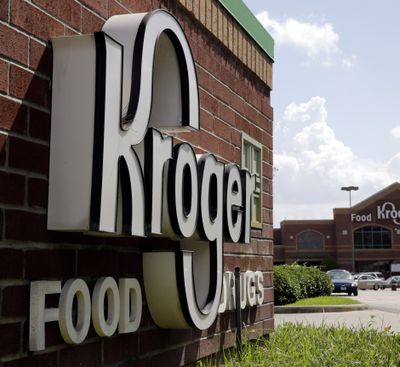Motley Fool: Kroger stock shapes up as smart buy

Supermarkets, with their thin profit margins, have long been a tough business. Despite that, Kroger has been prospering, averaging 12 percent annual gains for its stock over the past 20 years.
The company has been containing costs and boosting profits, growing faster than even Whole Foods Market. Indeed, it’s putting pressure on Whole Foods’ heftier profit margins as it moves aggressively into organic offerings with lower prices.
It’s building its digital presence, too, in part by buying digital coupon marketer YOU Technology. It also recently acquired the well-regarded Harris Teeter chain. Other efforts to drive growth include a big expansion of its gas station network to encourage repeat visits from shoppers, and the development of online retail and delivery options.
Kroger’s last quarter featured revenue rising 10 percent year-over-year. Earnings came in below expectations, but were still up 6.5 percent. Kroger’s performance is especially impressive given recent food-price inflation. Kroger has become an efficiency machine, generating more of its earnings from higher-margin, private-label items.
Kroger’s price-to-earnings ratio of 17 is well below its five-year average, suggesting it’s attractively priced. It recently yielded 1.3 percent and it has upped that payout by an annual average of 13 percent over the past five years. (The Motley Fool owns shares of and has recommended Whole Foods Market.)
Ask the Fool
Q: What are “Spiders”? – P.G., Keene, New Hampshire
A: “Spiders” is a nickname for Standard & Poor’s Depositary Receipts based on the S&P 500 index, and they’re also known as SPDRs.
Investors who own Spiders own bits of all the companies in the index, such as Intel, Hasbro, CVS Caremark, Estee Lauder, Gap, Kellogg, MetLife, Pfizer, Nike, Staples, UnitedHealth and Tractor Supply. Unlike index funds, which work much like traditional mutual funds, Spiders are “exchange-traded funds” (ETFs), structured like shares of stock, with the ticker symbol “SPY.”
While mutual funds sometimes require minimum investments of thousands of dollars, you can buy and sell as little as one Spider share (recent price: near $200) at a time. Learn more at fool.com/etf/etf.htm and morningstar.com/ Cover/ETFs.aspx. We recommend Spiders and low-cost, broad-market index funds for most, if not all, investors. They’re a simple way to own much of the U.S. stock market.
Q: What’s a zero-coupon bond? – S.B., Hickory, North Carolina
A: They’re a twist on regular bonds. Bonds are essentially loans, where you typically lend money to companies or governments.
With a traditional $10,000 bond that has a 5 percent interest rate, you lend $10,000 to the borrower (buying the bond) and receive interest payments of 5 percent per year. (In the past, people had to send in coupons in order to receive these payments.) When the bond matures, you get the principal, your $10,000, back.
With a zero-coupon bond, you collect no interest payments, but the amount you lend is less than the amount you’ll receive at maturity. Thus, a zero-coupon bond might pay you the equivalent of 5 percent per year by having you lend $6,139 today in order to receive $10,000 in 10 years.
My dumbest investment
My dumbest investment was Rite Aid, which I bought when it was trading around $14 per share. My son is 16, and it hasn’t seen $14 for almost all of his life. I can’t even find the shares now to sell them, but the U.S. mail reminds me every year that I’m still holding them. It’s now a reminder that your pharmacist is not likely to be the best stock adviser. – J.J., online
The Fool responds: Rite Aid did spend many years falling and falling – even below $1 per share. But it has been turning itself around rather impressively recently, with shares more than doubling in each of the past two years and trading above $7 per share in late June.
Investors need to keep up with the progress of the companies in which they invest, and to be ready to sell if their health or growth prospects deteriorate. To sell missing shares, call Rite Aid’s investor relations department to ask which transfer agent it uses. Then call that company to request duplicate certificates. It can be a costly hassle, though.